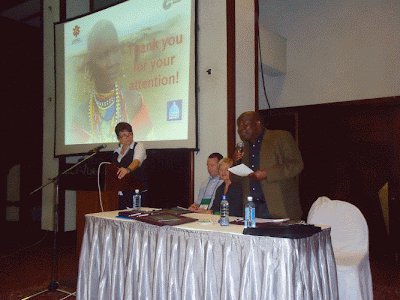 |
| Uganda Library and Information Association members Winners of SCECSAL 2012 Culltural Evening Performance |
The challenge is now for Malawi Library Association (MALA), designated host for SCECSAL 2014, to beat SCECSAL 2012. In my view, the areas requiring improvement, which MALA should look at, include the following:
- Registration process: the registration process at SCECSAL 2012 could have been better. I am sure that some individuals took advantage of the seemingly uncoordinated process and participated in the conference without registering and paying the registration fee. It is advisable to commence onsite registration at least a day before the conference to carter for the early arrivals, especially participants coming from outside the country.
- Access to conference venue/meeting rooms: only registered participants with valid participant’s badges MUST be allowed to enter the meeting rooms. Free access to the conference rooms at SCECSAL 2012 contributed to the security breaches and loss of valuable items experienced during the conference.
- Conference papers: some paper presenters complained that their papers were not included in the publication containing the conference papers. I know how difficult it might have been for KLA to have all the papers submitted in time for the publication. Maybe in future the organizers should inform potential paper presenters/authors to submit papers by a certain date, if they are to be included in the publication. Inclusion in the publication of paper submitted after that date should be at the discretion of the SCECSAL host Association. Host Associations should also ensure that basic editing and layout of the papers to ensure uniformity and consistence is done. This is visibly missing from the SCECSAL 2012 publication.
- Author Awards: why is it that only Namibia (2000) and South Africa (2002) managed to organize SCECSAL Author Awards? The Author Awards page on the SCECSAL web site outlines clearly the guidelines for awards. Shame on Uganda Library and Information Association (2004), Tanzania Library Association (2006), Zambia Library Association (2008), Botswana Library Association (2010) and Kenya Library Association (2012) for failing to organize the Author Awards competition!. Shame will also be on MALA if they fail to do so in 2014. As my Nigerian brothers and sisters would say: Chineke! God forbid.
- Minutes of the General Assembly: follow-up on the deliberations of the SCECSAL General Assembly is rather poor due to late distribution of the minutes of the meeting. Why should SCECSAL member Library Associations accept to distribute the minutes of the meeting two years after the meeting? Let Article 5 (5.6) of the SCECSAL constitution guide the host associations on this matter.
 |
| Zambia Library Association members Runners-up SCECSAL 2012 Culltural Evening Performance |




























